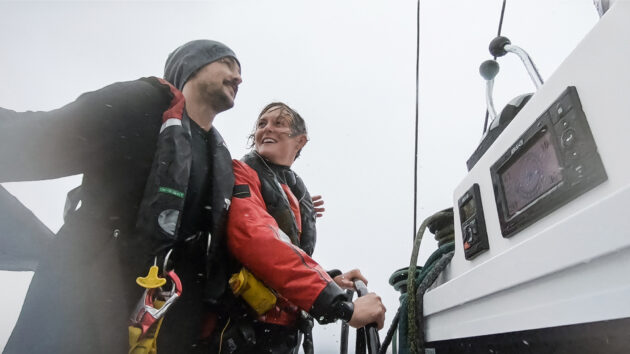What does it really mean to be the skipper of a boat? Above everything else, skippers are leaders, and must show leadership skills
Recently I was fortunate enough to find myself on the bow during a race. Well, I thought it was fortunate but appreciate that sentiment could be up for debate… I don’t get so much opportunity to play on the pointy end these days. It was fun!
I was readying the symmetric spinnaker for a bear away set. Having just fed the sheet and guy around to the starboard side and under the jib, I was bracing myself in some sort of yoga-starfish position. Right foot braced on a stanchion, left foot on the pulpit, my core muscles just about keeping me upright as I rolled the lines around to make sure they weren’t twisted before attaching them to the clew.
Thankfully, it all went up smoothly. It was a good reminder of how the slightest lapse of concentration (easy to happen when every third wave throws you in the air) with your head down in the action can leave you out of sight of the big picture. Quickly, a simple three clips to three corners can become an absolute mess.
I was up at the bow because I was teaching. I wasn’t on board working as an instructor – the crew were experienced sailors, and I was the skipper. But our kite hoists had been messy so I was demonstrating a few tricks to make things run smoother. The bow team took note, and we practised a few more times with much better results before the race that afternoon.

It can be easy to lost sight of the big picture at the bow. Photo: Richard Langdon
When I was 19, I passed my RYA Yachtmaster and the following week became an RYA Cruising Instructor. I remember how self-conscious I felt about doing the courses back-to-back, worried I’d be labelled as the over-ambitious youngster fast-tracking her way up the ladder.
But looking back, a five-day course on how to teach sailing was the perfect complement to my Yachtmaster Qualification. In fact, I’d encourage anyone who is taking a Yachtmaster to pair it with an instructor qualification. Because at the end of the day, skippers are leaders. And the greatest leaders are teachers.
“Why, oh why, do they still not know how to do this?” has asked every skipper I know at some point.
I feel the frustration! But it’s really annoying because deep down we know that it’s our fault, we just can’t think of another way to explain it. If an enthusiastic crew can’t do something, unless they have a physical incapability, they probably haven’t had the procedure explained in a way that they can understand.
Being knowledgeable is not enough for a skipper. Skippers also need to be able to communicate their knowledge to others. It’s probably the most defining factor in what makes a popular skipper. And a popular skipper with returning crew is more successful.
Article continues below…
‘What is it that makes parking a boat so tense?’ – Nikki Henderson
I distinctly remember the first time I parked a yacht with an inboard engine, badly. It was in Cowes marina…
Nikki Henderson’s advice on nurturing a high performing team
The first thing I do when I meet a new crew is gather everyone together and get each member to…
Things always go wrong at sea. There are too many unpredictable variables – humans, nature, weather, and… well… boats! Like good teachers, good skippers can turn mistakes into learning opportunities. With a good debrief, a birds eye view of what happened, an explanation of any ‘why’s, and a plan to avoid it happening again – all turn a bad day into a constructive day.
The best teachers know how to customise their communication style. They know when to give space, and when to help. They avoid the easy mistake of patronising one person by over-explaining, or leaving another feeling alone and confused by under-explaining.
And finally, good leaders are humble. A good teacher invites questions they don’t know the answer to and they nurture an open discussion-based culture in which they give and can receive feedback.
You might be thinking: this isn’t for me because I sail alone. Actually teaching others every now and then will still be valuable to you. It’s a quick way to expose gaps in your knowledge, provided you allow people to ask questions. Whenever you teach you will be reminded of the ‘by-the-book’ methods. This can shake you out of complacency and bad habits.
Right now, skippering qualifications do not put much emphasis on leadership skills, which is crazy to me. So, as a skipper we need to take this into our own hands. And I’d say that applying some teaching skills is the fastest and most effective way to improve the way you lead. Even better is to become an instructor and do it for real.
 If you enjoyed this….
If you enjoyed this….
Yachting World is the world’s leading magazine for bluewater cruisers and offshore sailors. Every month we have inspirational adventures and practical features to help you realise your sailing dreams.Build your knowledge with a subscription delivered to your door. See our latest offers and save at least 30% off the cover price.






